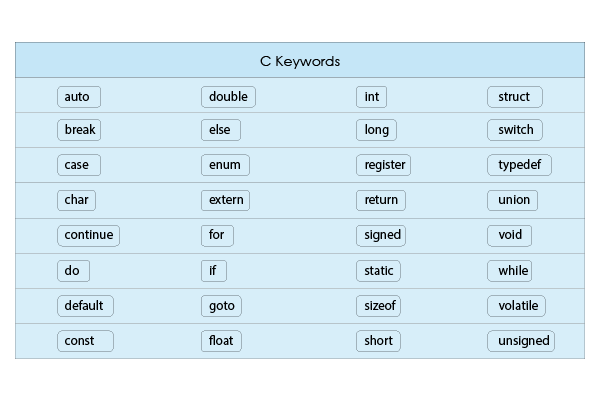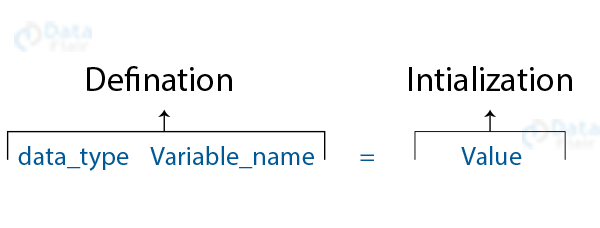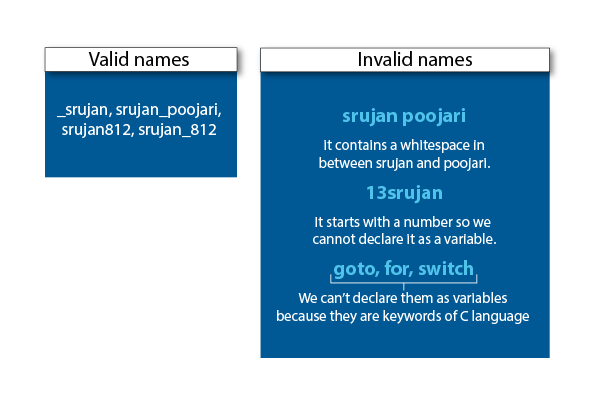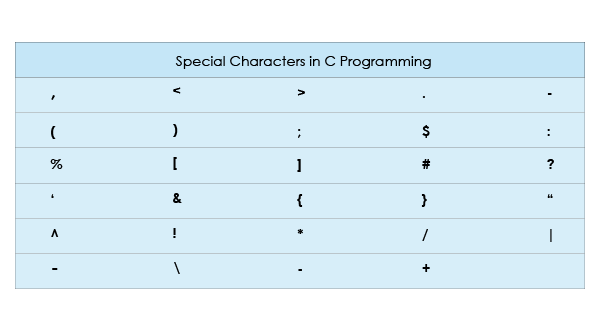Rules for Declaring Variables and Identifiers in C
Welcome to this blog that delves into the fundamental rules governing the declaration of variables and identifiers in the C programming language. As a budding technical content writer, I understand the importance of clarity and simplicity in conveying complex information. So, let’s embark on this journey to demystify the key principles of variable and identifier declarations in C.
Understanding Variable and Identifier Declarations
In the realm of programming, variables are symbolic names assigned to storage locations, while identifiers are names given to various program elements such as variables, functions, and arrays. These identifiers help us differentiate and access different program entities.
Key Rules
- Uniqueness: Identifiers must be unique within the same scope. For instance, you cannot declare two variables with the same name within the same block of code.
- Character Set: Identifiers can comprise letters, digits, and underscores (_), starting with a letter or underscore. However, they shouldn’t be C keywords.
- Case Sensitivity: C is case-sensitive, meaning ‘variableName’ and ‘variablename’ would be treated as distinct identifiers.
- Length Limit: While there isn’t a strict length limit for identifiers, it’s advisable to keep them concise for better readability.
- Reserved Words: Avoid using reserved words like ‘int,’ ‘if,’ or ‘while’ as identifiers since they have predefined meanings in C.
Rules for naming identifiers
- A legitimate identifier is allowed to consist of letters (both uppercase and lowercase), digits, and underscores. The initial character of an identifier should be a letter or an underscore.
- Usage of keywords such as “int” or “while” as identifiers is not permissible.
- While there is no formal limitation on the length of an identifier, certain compilers may pose issues if the identifier surpasses 31 characters.
Rules for naming and declaring Variables
- Meaningful Names: Choose names that convey the purpose or content of the variable. This makes your code self-explanatory and easier to understand for both you and other programmers.
- CamelCase or Underscores: Follow a consistent naming style. The two most popular styles are CamelCase (e.g., totalCount) and underscore (e.g., total_count). Stick to one style within your codebase to maintain uniformity.
- Start with a Letter or Underscore: Begin variable names with a letter (uppercase or lowercase) or an underscore. Avoid starting with digits or special characters.
- Avoid Reserved Keywords: Do not use reserved keywords like “int,” “while,” or “if” as variable names.
- Case Sensitivity: Most programming languages are case-sensitive, so “myVariable” and “MyVariable” would be treated as distinct identifiers.
- Descriptive and Concise: Aim for descriptive yet concise variable names. Avoid excessively long names that can make your code harder to read.
- Avoid Abbreviations: While abbreviations can save typing effort, they might make your code less understandable. Opt for clarity over brevity.
- Declare Before Use: Always declare variables before using them in your code. This informs the compiler about the variable’s type and ensures proper memory allocation.
- Initialization: Initialize variables when declaring them, if possible. This helps prevent using variables with unpredictable or garbage values.
- Scope Consideration: Variables have different scopes (contexts where they are valid). Declare variables in the appropriate scope to avoid unintentional collisions.
- Comments: If a variable’s purpose isn’t immediately clear from its name, consider adding a comment explaining its role in the code.
Examples
Consider a scenario where you want to store an individual’s age and name in variables. You could declare them as follows
int age; // Declaration of an integer variable 'age' char name[50]; // Declaration of a character array variable 'name'
#include <stdio.h>
int main() {
// Variable declaration and initialization
int age = 25;
float salary = 4500.50;
char initial = 'J';
char name[] = "John";
// Printing the values of variables
printf("Name: %s\n", name);
printf("Initial: %c\n", initial);
printf("Age: %d\n", age);
printf("Salary: %.2f\n", salary);
// Updating variable values
age = 26;
salary = 4800.75;
// Printing updated values
printf("\nAfter updates:\n");
printf("Age: %d\n", age);
printf("Salary: %.2f\n", salary);
return 0;
}Output:
Name: John
Initial: J
Age: 25
Salary: 4500.50
After updates:
Age: 26
Salary: 4800.75
Special Characters in C
C Keywords
Best Practices and Coding Etiquette
Technology is evolving rapidly!
Stay updated with DataFlair on WhatsApp!!
When declaring variables and identifiers, it’s crucial to follow coding best practices to enhance code readability and maintainability.
Here are a few tips:
- Descriptive Names: Use meaningful names that convey the purpose of the variable or identifier.
- Comments: Add comments to clarify the purpose of complex or critical variables.
- Logical Variable Names: Ensure your variable names make logical sense. For instance, if you’re storing a person’s age, use ‘age’ instead of ‘x.’
- Consistency: Maintain a consistent naming convention throughout your codebase.
Conclusion
In conclusion, understanding the rules for declaring variables and identifiers is foundational to writing effective C programs. By adhering to these rules, you’ll create code that is not only readable but also easily maintainable. As you embark on your technical writing journey, keep these principles in mind to ensure that your coding efforts are both efficient and productive.
If you are Happy with DataFlair, do not forget to make us happy with your positive feedback on Google





